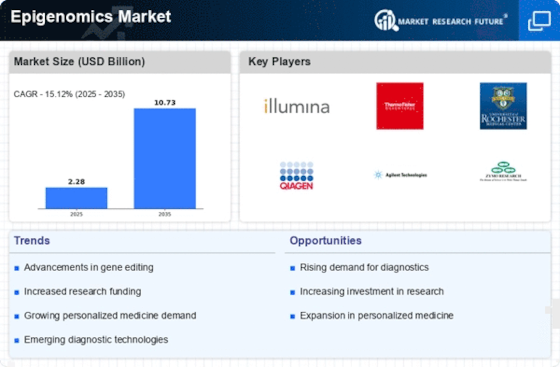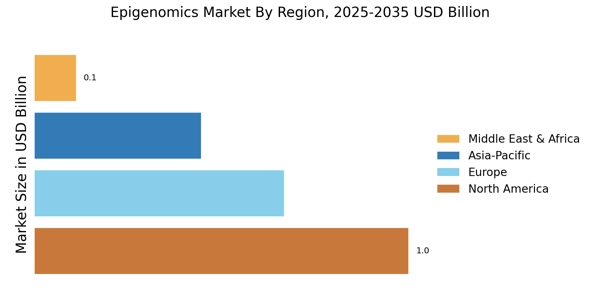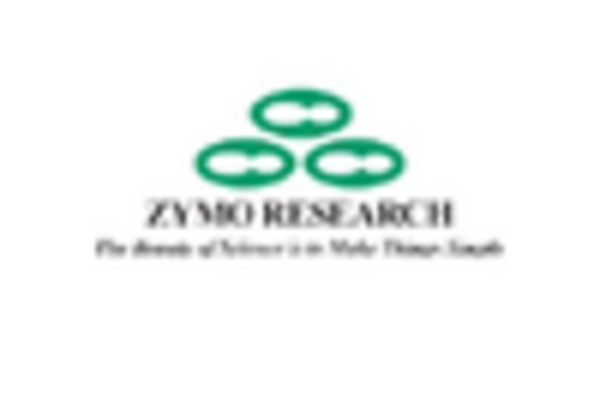Collaborative Research Initiatives
The Epigenomics Market is benefiting from an increase in collaborative research initiatives among academic institutions, biotechnology firms, and pharmaceutical companies. These partnerships are fostering innovation and accelerating the development of epigenetic therapies. For instance, large-scale consortia are pooling resources to conduct comprehensive epigenomic studies, which are essential for understanding complex diseases. Such collaborations have the potential to enhance data sharing and standardization, which are critical for advancing the field. The establishment of public-private partnerships is also noteworthy, as they facilitate the translation of research findings into clinical applications. This collaborative spirit is likely to drive the Epigenomics Market, as it encourages the sharing of knowledge and resources, ultimately leading to breakthroughs in epigenetic research.
Rising Demand for Personalized Medicine
The Epigenomics Market is witnessing a notable shift towards personalized medicine, driven by the increasing recognition of the role of epigenetics in individual health. As healthcare moves away from a one-size-fits-all approach, the demand for tailored therapies based on a patient's unique epigenetic profile is growing. This trend is supported by the fact that approximately 70% of diseases are influenced by epigenetic factors, highlighting the potential for epigenomic insights to inform treatment strategies. Pharmaceutical companies are investing heavily in epigenetic research to develop targeted therapies, which is expected to propel the Epigenomics Market forward. The integration of epigenomic data into clinical practice could revolutionize treatment paradigms, making personalized medicine a key driver of market growth.
Technological Advancements in Epigenomics
The Epigenomics Market is experiencing a surge in technological advancements that enhance research capabilities. Innovations in sequencing technologies, such as next-generation sequencing (NGS), are enabling researchers to analyze epigenetic modifications with unprecedented accuracy. This has led to a significant increase in the volume of epigenomic data generated, which is projected to reach over 1 exabyte by 2026. Furthermore, advancements in bioinformatics tools are facilitating the interpretation of complex epigenetic data, thereby accelerating the pace of discovery in areas such as cancer research and developmental biology. As these technologies continue to evolve, they are likely to drive investment and interest in the Epigenomics Market, fostering a more robust research environment.
Regulatory Support for Epigenetic Therapies
The Epigenomics Market is benefiting from a favorable regulatory environment that supports the development and approval of epigenetic therapies. Regulatory agencies are increasingly recognizing the potential of epigenetic modifications as therapeutic targets, leading to streamlined approval processes for novel treatments. This regulatory support is crucial, as it encourages pharmaceutical companies to invest in epigenetic research and development. In recent years, several epigenetic drugs have received expedited review status, which is indicative of the growing acceptance of epigenetic approaches in mainstream medicine. As regulatory frameworks continue to evolve, they are likely to provide a conducive environment for innovation, thereby propelling the Epigenomics Market forward.
Increasing Investment in Epigenetic Research
The Epigenomics Market is experiencing a rise in investment from both public and private sectors, reflecting the growing recognition of the importance of epigenetics in health and disease. Funding for epigenetic research has seen a substantial increase, with government grants and venture capital flowing into innovative projects. In 2025, it is estimated that funding for epigenetic studies will exceed $2 billion, underscoring the commitment to advancing this field. This influx of capital is likely to support the development of new technologies and therapies, thereby expanding the market. As researchers uncover more about the epigenome's role in various diseases, the potential for commercial applications becomes increasingly apparent, further driving investment in the Epigenomics Market.

















